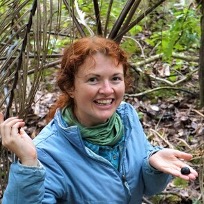 Dr. Shelley Langton-Myers
Dr. Shelley Langton-Myers
Ecology Lecturer
EcoQuest Education Foundation
Aotearoa New Zealand
I grew up in New Zealand’s largest city – Auckland.
As a kid I loved all animals from bugs in the garden, to visiting animals at the zoo. My parents were rather obliging to my desire to bring every animal home.
I grew up with fish, birds, rabbits, cats, and a beagle as pets. Growing up I had no idea that it was possible to be an ecologist. I knew I wanted to work with animals, and I thought that meant becoming a vet. In New Zealand there is only one university that offers a degree in Veterinary Science- Massey in Palmerston North. The career I thought I wanted dictated taking the sciences at high school (biology, chemistry, physics, statistics, classical studies, and the compulsory religious education were the subjects I took in my final year of the Catholic High School I attended).
The first semester of the Veterinary Science degree is general science taken by hundreds of students which 75 hopefuls get selected from. I was not one of the selected students. That first semester taught me I love science and my favourite subjects to learn about were genetics and wildlife.
I continued at Massey completing a BSc majoring in genetics and zoology. This is where my passion for the outdoors grew. The entomology class was my favourite during undergrad, I was especially intrigued by our endemic stick insects. I approached Prof. Mary Morgan-Richards who lectured about stick insects and informed her that I needed to know more. She was keen to have graduate students investigating the origins of parthenogenesis in the Acanthoxyla genus, I ended up doing an honours year with her as my supervisor. I was really lucky that at the end of my honours year Landcare Research was advertising Ph.D. scholarships for researching stick insects- the timing could not have been better for me. I applied to work on another stick insect genus Clitarchus. I was selected and moved back to Auckland to complete my Ph.D. It was a great experience to complete my Ph.D. at a crown research institute, rather than being based at a University, this enabled me to learn about the different environments available to work in. We had a great lab at Landcare with Thomas Buckley as a supervisor and a little stick insect team made up of a post-doc and two Ph.D. students. I enjoyed the research and saw the Ph.D. as a time to trial methods to work out what I enjoyed. My work on Clitatchus included behavioural studies, genetic sequencing and taking micro-CT scans to model shape changes between species.
I really enjoyed the behavioural and genetic work but found the CT-scanning incredibly tedious- despite the fancy looking results, I knew I never wanted to do that again.
After completing my Ph.D. it was important to me to experience labs overseas. I ended up as a post doc at Clemson University studying endemic beetle distributions in the Southern Appalachians. This involved hiking the Appalachians to collect leaf-litter insects in the summers and lab work in the winter- an absolute dream! I loved the friendly environment of the Caterino Arthropod Biodiversity Lab and enthusiasm of the American entomology community. When my two years of funding was up, I was sad to leave America, but it was time to return home. My boyfriend (now husband) had stayed in NZ, and my family is important to me. I applied for a job at the EcoQuest Education Foundation and have been here ever since.
I could not be happier with where I have ended up. EcoQuest enables me to conduct research, share my enthusiasm of people and place with others and teach ecology to enthusiastic students. What has been important for me along my path is doing what I enjoy, taking opportunities as they arise, and believing in the transferability of the skills I gained along the way. University and the sciences teach you how to think and learn, these are important skills that can be utilized in any discipline you find yourself in.